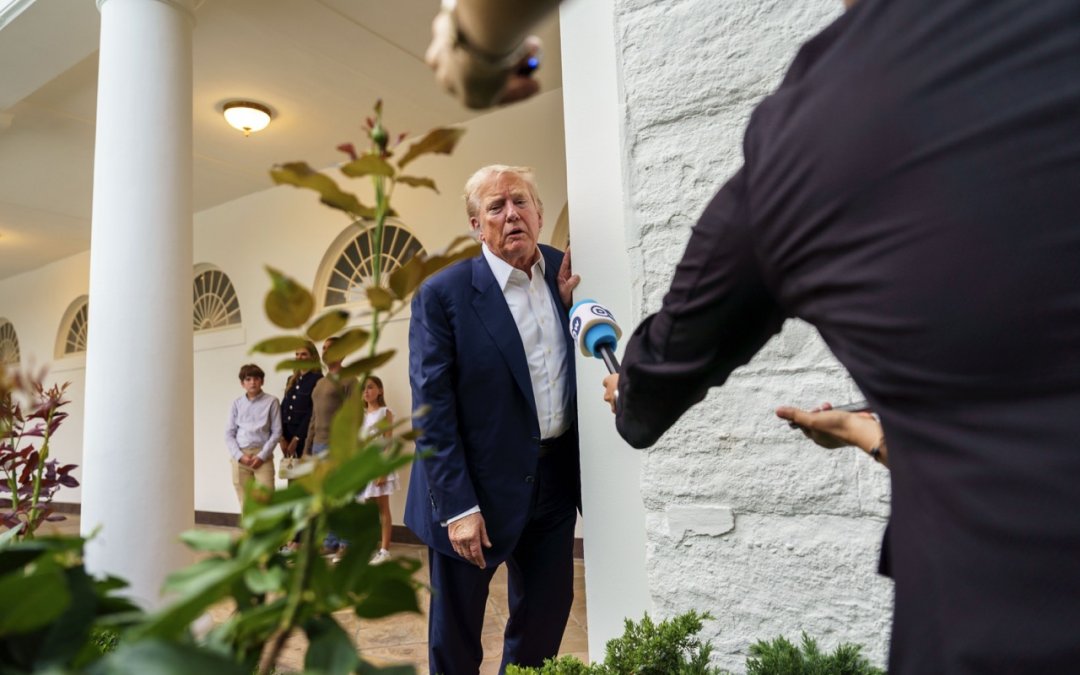WASHINGTON — Paul Ingrassia withdrew his nomination to lead the Office of Special Counsel on Tuesday night after facing Republican pushback over past controversial statements.
While Ingrassia joins a growing list of President Donald Trump’s nominees who have withdrawn from consideration, many who have aired controversial beliefs or lack requisite qualifications have still been appointed or are still in the nomination process.
“Trump has gone the distance to nominate people who are loyalists, people that he can count upon to do what he wants,” said Stanford political science professor Terry Moe. “And for the most part, senators have just been willing to embrace anyone that he nominates.”
Moe said, compared to past presidents, Trump has taken his determination to consider loyalty in presidential appointments “to the extreme,” laying aside the normal concern for competence.
Only a small group of senators have demonstrated a willingness to stand up against Trump’s appointments, and only behind closed doors, Moe emphasized. This was apparent in Ingrassia’s case — some senators reportedly “spent months quietly raising the alarm” against him.
Ingrassia was scheduled to appear before the Senate Homeland Security Committee for a confirmation hearing on Thursday, but had encountered opposition over his past use of racist language, promotion of conspiracy theories and connection to Nick Fuentes, a White nationalist and Holocaust denier.
On Monday, Politico reported Ingrassia had told a group of fellow Republicans in a text chain that he has “a Nazi streak” and that the Martin Luther King Jr. holiday belongs in the “seventh circle of hell.”
Ingrassia’s lawyer would not confirm to Politico that the texts were authentic, instead implying that the texts could have been “manipulated” and were intended to make fun of liberals.
Senate Majority Leader John Thune (R-La.) suggested Monday night to reporters that the administration should withdraw Ingrassia’s nomination.
“He’s not going to pass,” Thune said.
At least three other Republicans on the committee indicated they would oppose Ingrassia’s confirmation: Sens. Rick Scott (R-Fla.), Ron Johnson (R-Wis.) and James Lankford (R-Okla.).
Committee Democrats were also expected to vote against Ingrassia and have condemned his speech.
“This clear pattern of bigoted and inflammatory rhetoric along with his complete lack of any — any — relevant experience, is wholly disqualifying,” said Sen. Gary Peters (D-Mich.) on Thursday. “Paul Ingrassia should have never been nominated for such a critical oversight role, but his insistence just exemplifies the Trump administration’s outright contempt for independent oversight.”
Trump nominated Ingrassia in May to lead the Office of Special Counsel, a traditionally independent agency that enforces civil service laws and protects federal whistleblowers. Ingrassia is currently a White House liaison at the Department of Homeland Security.
Republicans delayed Ingrassia’s confirmation hearing in July, with one pointing to concerns about his alleged ties to antisemitism. He has also faced accusations of sexual harassment.
In withdrawing from consideration, Ingrassia joins a group of Trump nominees who have been pushed to remove their names from consideration after some form of wrongdoing.
Before Trump entered office in his second term, former Florida congressman Matt Gaetz withdrew as the nominee for attorney general after reports emerged that he had sex with a minor.
Last month, Trump withdrew his nomination for E.J. Antoni to lead the Bureau of Labor Statistics after CNN reported on his now-deleted Twitter account that “featured sexually degrading attacks on Kamala Harris, derogatory remarks about gay people, conspiracy theories and crude insults aimed at critics of President Donald Trump.”
Still, many Trump nominees have been confirmed despite known misconduct and a lack of qualifications. Defense Secretary Pete Hegseth, for instance, faced allegations of sexual assault, excessive drinking and financial mismanagement. Just recently, the Senate confirmed Herschel Walker as the U.S. ambassador to the Bahamas, even though two women have accused him of domestic abuse. The Senate also confirmed Joe Kent, who is affiliated with the Proud Boys, to lead the National Counterterrorism Center.
“There are many people who are willing to engage in extremist behavior who get nominated, who these Republican senators vote for,” Moe said. “This Paul Ingrassia situation is just the exception to the rule. For the most part, there are all sorts of extremists who have been appointed and Republicans are willing to fall in line.”
And, ongoing nomination processes have grown heated, as Democrats attempt to limit executive overreach. On Thursday, as the Senate Homeland Security Committee considered the rest of the nominations on its agenda, one seemingly contentious idea came to the fore: the independence of the Office of Inspector General.
Former congressman Anthony D’Esposito, who is up for consideration to be the Inspector General of the U.S. Department of Labor, received particular attention.
During his nomination hearing on Thursday, Peters accused D’Esposito of being a “partisan operative,” as he had allegedly written a “pledge to carry out the president’s agenda” in his opening statement.
“President Trump has a vision to reign in the golden age of the American worker,” D’Esposito said when asked to comment on this claim. “I don’t believe that’s partisan. I don’t believe creating the fiercest, strongest military is partisan. I think that all should be American.”
Sen. Margaret Hassan (D-N.H.) also pressed D’Espesito and other nominees as to whether they would choose to uphold the rule of law or Trump’s agenda, two things that she said come into conflict.
In response, D’Espesito said Trump is a “man of integrity” who would never ask the nominees to break the law.
Hassan wasn’t satisfied.
“Your answer defies the factual record,” she said.


